Ask a question from expert
BUS 3010 Management and Organizational Behavior : Assignment
22 Pages5031 Words274 Views
Added on 2019-10-16
BUS 3010 Management and Organizational Behavior : Assignment
Added on 2019-10-16
BookmarkShareRelated Documents
Module: Global Influences (BUS 3010F)Individual Reflection Paper: 3,000 words with presentation Opening:Why is globalization good? – Your opinionFor example: Globalization is good because it provides the world with more efficient markets, increases competition leading to better goods, generates wealth in all parts of the world and builds and stabilizes security.Globalization is steadily growing as technology allows individuals within each country to communicate with people previously out of reach.The world is becoming increasingly interconnected as governments work together to solve global problems. The globalization process has made markets more efficient as businesses and organizations have had to relearn how to create a good or offer a service in the most efficient manner in order to make a profit.The increased competition is another benefit of globalization. With new producers appearing frequently, there are more people and businesses competing for a share of the global economy. This leads to competitive markets that offer higher quality of goods as well as more affordable prices.Another benefit of globalization is the change it offers to people in poorer countries. Itgives these people a chance, though perhaps not nearly as great as the chance people have in wealthier nations, to sell goods and to make a profit leading to greater wealth distribution. Globalization also protects the world as countries depending on one another for their economy stability are less likely to attack one another.
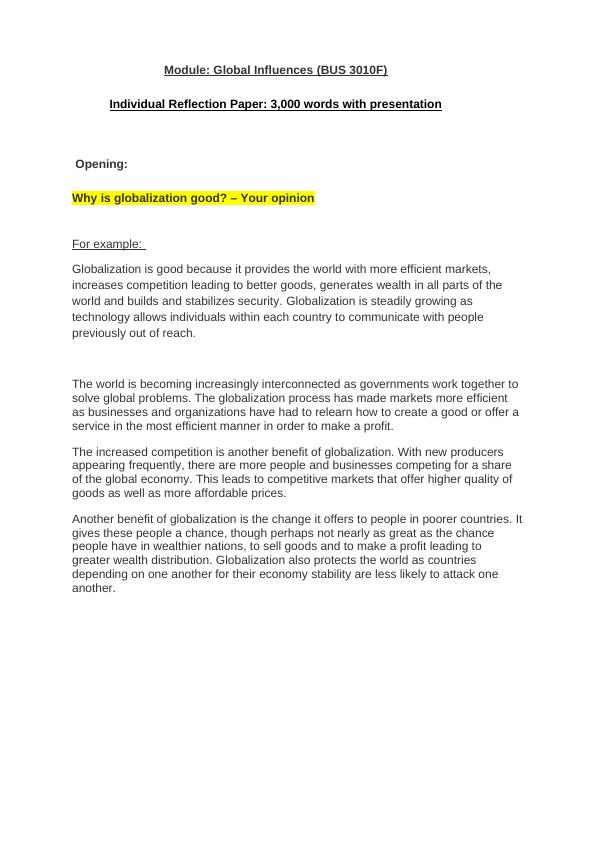
Answer all 7 questions:Q1: Do you agree with the “Hyper Globalist” claim that the world is borderless. Give three (3) reasons to support your answer if yes or no. (15 marks) - 450 wordsFor Example:Yes agreed, to the hyper globalist’s view is of a more interconnected world today, due to improvements in technology. What happens to one part of the world could be made known in quick time.Cross-over of culture is more evident because of globalization from affluent / sophisticated markets to developing once.........pl include referencing of research materials.(450 words).

Q2: What are some of the features of ASEAN regional grouping and their implications to members? (15 marks) – 450 wordsFor example:Co-operations in: Political –Security, Economic & Soci0-Cultural Community attended by the head of state...With particular emphasis on:XXXX during the 2016 ASEAN Summit held in Laos..please include referencing from research materials..(450 words). Cover during Session #5ASEAN SUMMIT HELD SEPT 2016 IN LAOS (29th)(Ref: http://asean.org/chairmans-statement-of-the-28th-and-29th-asean-summits/)-Feature 1: We were pleased to note that in 2015, ASEAN received 108.9 million international visitors, an increase of 7.3% from 2014. We welcomed the ASEAN Tourism Strategic Plan (ATSP) 2016-2025 with a vision for ASEAN as a quality tourism destination by 2025, offering a unique, diverse ASEAN experience, and committed to responsible, sustainable, inclusive and balanced tourism development, so as to contribute significantly to the socio-economic well-being of ASEAN people.-Implications to members: Increase spending by incoming tourist by: STPB as S’poreis also an attractive country to consider when coming to Asia. All the international standard activities / events ie: Night F1 race in Sept etc........-Feature 2: We reaffirmed our shared commitment to maintaining and promoting peace, security and stability in the region, as well as to the peaceful resolution of disputes, including full respect for legal and diplomatic processes, without resorting to the threat or use of force..........-Implications to members: Increased regional measures with S’pore being the site of:Interpol shows our / S’pore commitment to handle terror in a concerted effort. Thus S’pore being a safer location for worldwide corporate investment and for leisure.......-Feature 3:ASEAN Community Vision 2025 and the United Nations 2030 Agenda forSustainable Development.
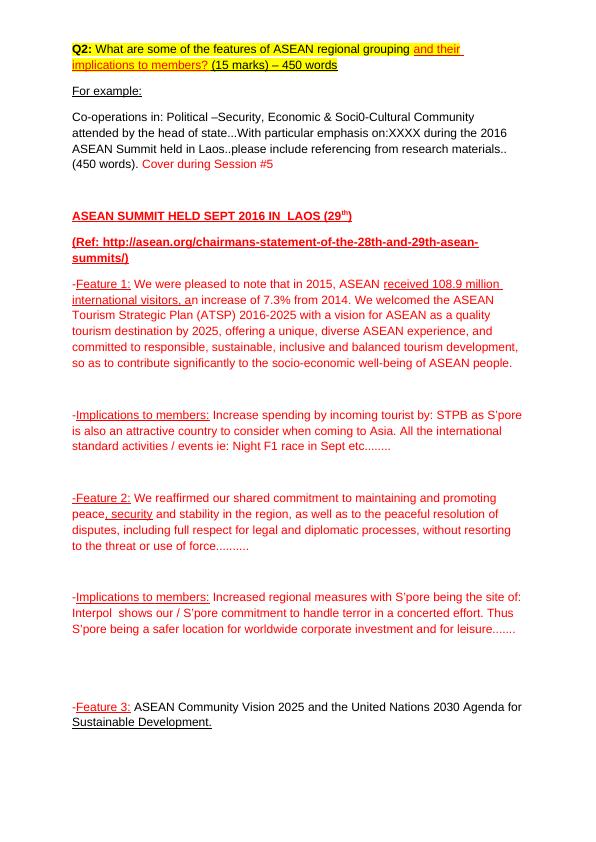
-Implications to members: This is to show that S’pore is an affluent country and also is doing her part in the “Green Movement” as in prevention of pollution and saving the world from global warming. Do as your neighbours do....(all other companies in that sector)....-Feature 4: Counter Terrorism...Mentioned under security and stability...-Implications to members: .....-Feature 5: Drug trafficking...-Implications to members:TheMisuse of Drugs Actis a drug control law in Singapore, The statute's penal provisions are draconian by most nations' standards, providing for long terms ofimprisonment, caning, and capital punishment.-Feature 6: Money Laundering....- Implications to members: SINGAPORE — Singapore takes the possibility of being used as a conduit for money laundering and terrorist financing activities “very seriously”, and the Monetary Authority of Singapore (MAS) will not hesitate to take action against financial institutions whose anti-money-laundering controls are found to be lacking, Minister for National Development Lawrence Wong said in Parliament yesterday.
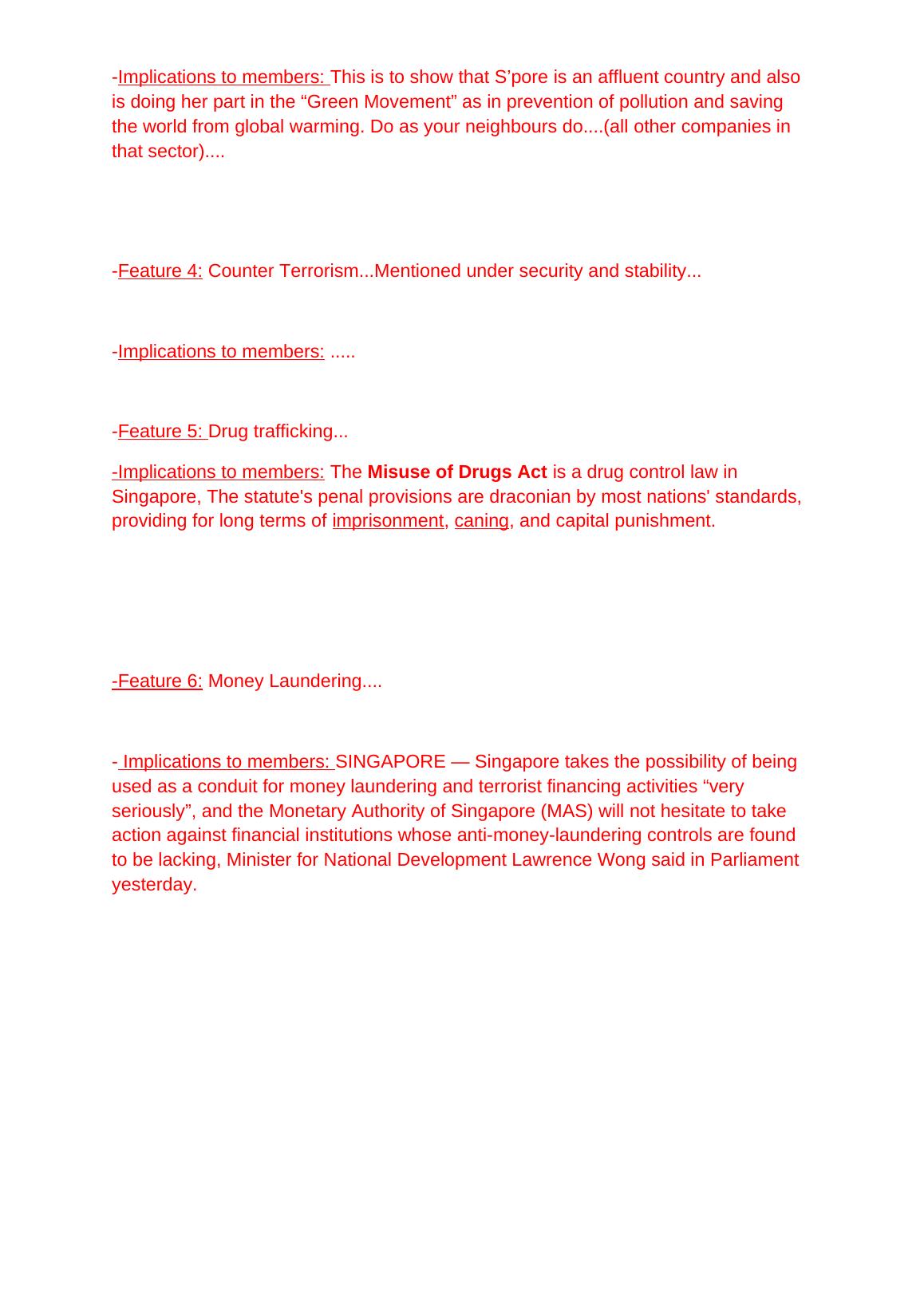
MAS announced in May it had ordered BSI to shut down its operations here, citing serious breaches of anti-money-laundering rules, and had referred the names of six BSI staff — including its former CEO and Deputy CEO — to the public prosecutor to evaluate if they have committed any criminal offences.Emphasising Singapore’s firm stance against illicit financing activities, Mr Wong yesterday reiterated the recent measures taken to strengthen Singapore’s regime against money laundering, including criminalising the laundering of serious tax offences; enhancing MAS’ notices and guidelines in line with evolving international standards; and stepping up inspections of financial institutions.Projecting S’pore as a clean and vibrant financial hub .-Feature 7: Cyber security.....- Implications to members:-Feature 8: ASEAN –ICT Masterplan 2020...Co-ordinating effort of ASEAN membersfor info-Communication Technology.- Implications to members: ICT cutting –edge development is a must in S’pore infrastructure development and doing it together will attract investor companies to the entire region for all sectors..
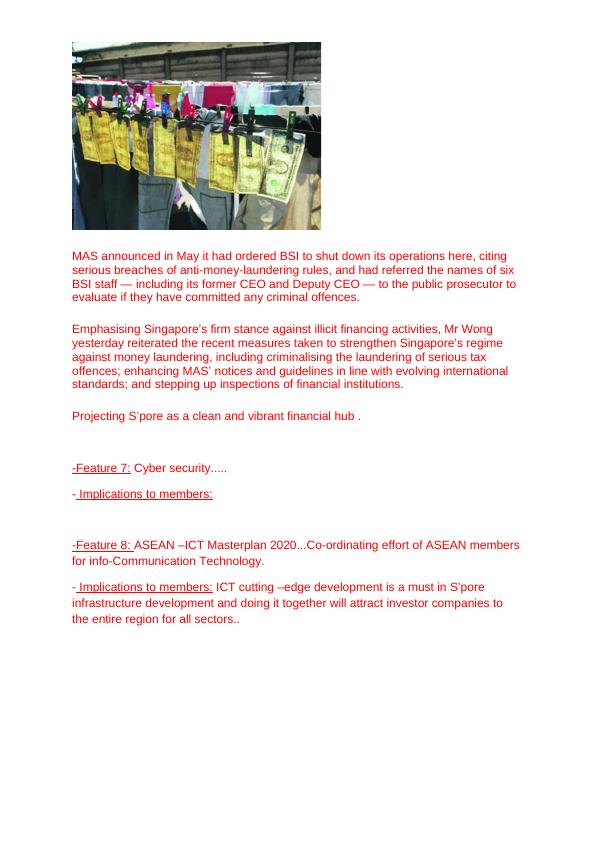
Q3: What is your understanding of the BREXIT? And express your views of the exit.(20 marks) – 600 wordsFor example:There were unhappiness with the Brits when they were part of the EU, other then :Germany and Luxembourg that is doing well the other member states are not doing well and Britain do not want to be drag down by them.., thus a people’s referendum / vote was called with around a 4% win to leave....., it’s unclear somewhat to the further of BREXIT ..please include referencing from research materials..(600 words).An approach:-In short there are more gains socially ?....W3..after researching on social gains ..is that they have all economic implications..Looks likes the freedom of not following ideas & policies of the EU made Brits feel better socially and not economically...emotions over logic..(Ref: https://www.theguardian.com/society/2016/jun/14/brexit-nhs-health-social-care-disabled-people-eu-referendum)..(+)The FPH lists other advantages too. “Health and safety at worklegislation is basically European; likewise legislation ensuring the safety of food, medicinal products and medical devices. The social chapter mandates generous maternity and paternity leave,guaranteed holidays, the 48-hourworking time directive; equal rights for part-time workers and protection against unfair dismissal. All are powerful social determinants of health from which UK citizens have benefited.(-)The Faculty of Public Health also points out howEU membership has brought benefitssuch as cleaner air and water and pan-European joint working on threats to health that cross national borders, such as antibiotic resistance and combating pandemics.-The European convention on human rights, given statutory forcein the Human Rights Act (HRA), has played an increasingly important part in social care.
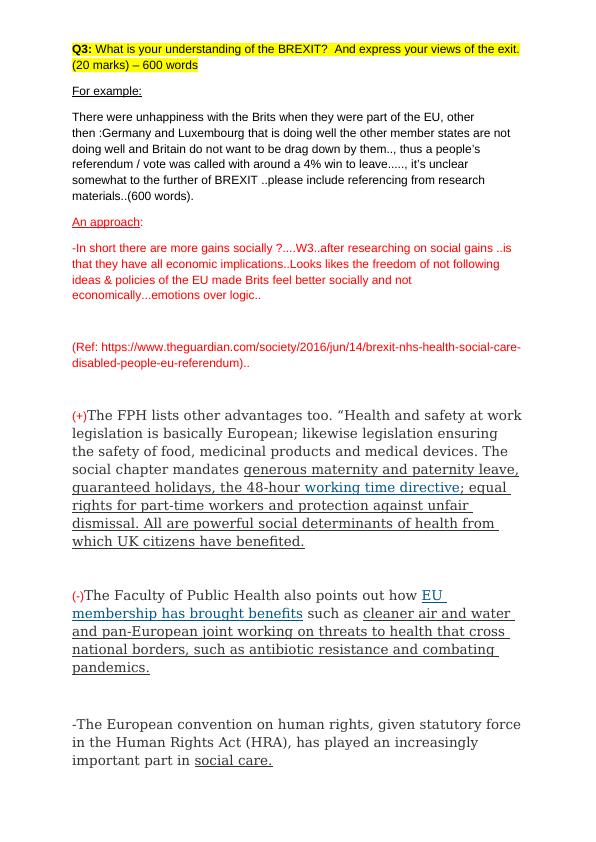
End of preview
Want to access all the pages? Upload your documents or become a member.
Related Documents
Desklib - Online Library for Study Material with Solved Assignmentslg...
|14
|3612
|230
Globalization and Benefits : Assignmentlg...
|13
|4246
|215
Importance of Globalization, ASEAN Regional Grouping, Brexit, Green Movement, Culture and Anti-Money Laundering Regulationslg...
|20
|3913
|252